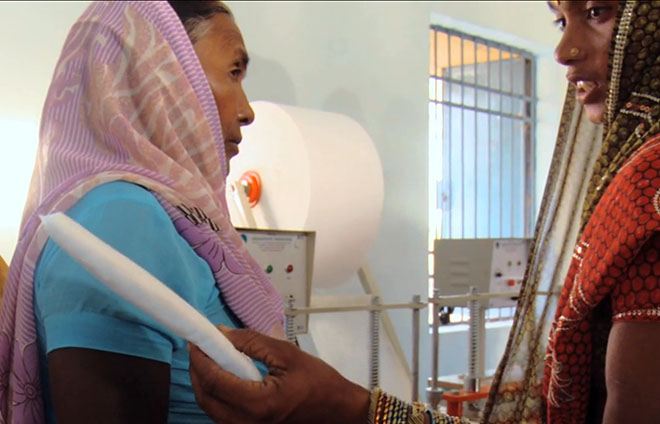A touching BBC story describes a new documentary, Menstrual Man, that chronicles the trials and tribulations of a humble man in India who sought to offer his wife a sanitary napkin. After marrying, he discovered that his wife kept from him a secret: the rags she used and re-used to collect menstrual blood.
Only 12 percent of women in India used pads; they were simply too expensive for most to buy. Nearly three-quarters of all reproductive diseases were caused by poor menstrual hygiene. A combination of high cost and embarrassment kept women from developing a safe method of managing menstruation. Nearly a quarter of girls dropped out of school when they started their periods.
Arunachalam Muruganantham was driven to offer women a solution. He was going to design a machine that would produce low cost menstrual pads. He asked his wife to serve as an experimental subject, but one woman menstruating once a month wasn’t enough of a sample. He asked medical students to participate, but the responses were slim. He fashioned a fake uterus and collected goat blood, trying to experiment himself.
“Everyone thought he’d gone mad.”
His wife left, his mother left, his friends avoided him; it was suspected he was some kind of diseased or possessed sexual pervert, collecting menstrual blood to do God-knows-what.
Figuring out how to make highly absorptive cotton was a significant challenge. He finally tricked a multinational company into sending him samples of the raw material: cellulose from the bark of the tree. Now he just had to design a cheap machine that would turn the raw material into pads.
Four-and-a-half years later, he was producing affordable menstrual pads for Indian women on a cheaply made machine. He won an award. His wife came back.
He built 250 machines, which he then took to the poorest areas of Northern India. He gave them to women, at no profit, who could then produce the pads and sell them to local women. Each woman now runs her own business. ”Over time the machines spread to 1,300 villages in 23 states.”

A still from Menstrual Man. (Photo: Amit Virmani)
He is now looking to expand to 106 more countries.
About his success, Muruganantham said:
Anyone with an MBA would immediately accumulate the maximum money. But I did not want to. Why? Because from childhood I know no human being died because of poverty — everything happens because of ignorance…. I have accumulated no money but I accumulate a lot of happiness.
Watch the trailer here.
This post originally appeared on Sociological Images, a Pacific Standard partner site, as “Liberation and the Sanitary Napkin: One Man’s Journey.”




